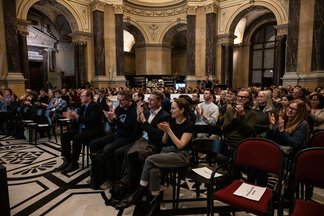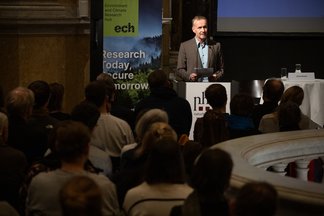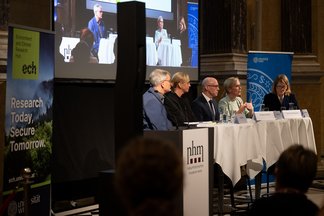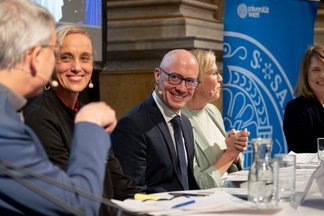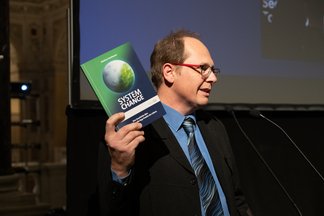14th Environmental Dialogue: Sustainable Living - Between Ideal and Reality
Sustainability has long been a guiding principle, but our structures often stand in the way of change: political objectives, economic interests and individual options for action come into conflict with one another, making ecological behaviour in everyday life a challenge. At the 14th Environmental Dialogue, experts from science, politics and business discussed how sustainable living can be achieved without sacrifice – and what systemic changes are necessary for social change to succeed.
Why it is so difficult to live in an environmentally friendly way – and what that reveals about our society
The ecological crises are here, the scientific findings are on the table, the solutions are known. And yet too little is being done – in everyday life, in politics, on a global scale. There is a gulf between knowledge and action. This paradox of sustainability was the focus of the 14th edition of the Environmental Dialogue series, organised by the University of Vienna's Environment and Climate Research Hub (ECH) at the Natural History Museum. Around 260 visitors came to the museum's Upper Dome Hall, a sign for the big need for guidance in times of ecological and social transformation.
The highlights of the event
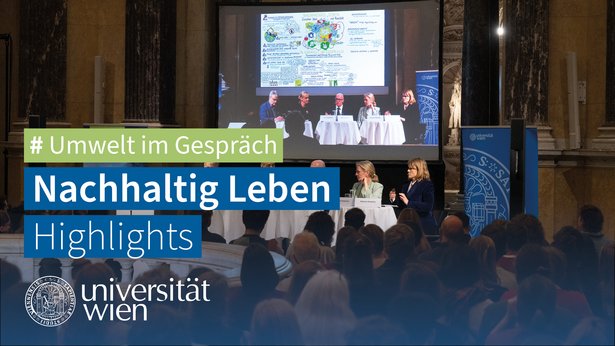
"Environmental protection is human protection"
"Humans are irreversibly changing the climate and the environment," said Andreas Kroh, Deputy Scientific Director of the NHM Vienna, in his opening remarks, reminding the audience of the issue’s urgency. Anyone who walks the world with open eyes can hardly overlook the consequences. Kroh called for a change of perspective: "Environmental protection is human protection," he explained, "and we humans must take care that, as drivers of change, we leave our descendants a planet that is still worth living on." According to Kroh, the NHM contributes to raising awareness of this responsibility through research and education. Events such as the ECH's Environmental Dialogue are an important format for reaching people and getting them to think.
Between climate fatigue and a new narrative
"It is no coincidence that we have scheduled today's event to coincide with the week of the 30th World Climate Conference in Belém, and I believe we have rarely had lower expectations of a climate conference," stated Thilo Hofmann, ECH co-director, in his welcoming address, taking a look at the social mood surrounding climate protection.
While there was still a spirit of optimism in 2019, today fatigue and resistance are palpable in many places. Climate protection is increasingly perceived as an imposition, ecological modernisation as an excessive demand. "People fear costs, restrictions and loss of control," said Hofmann. At the same time, progress is being made – renewable energies are spreading and new political instruments are taking effect. "But fewer and fewer people are still motivated by this good news."
He therefore called for a new narrative in sustainability communication, quoting Luisa Neubauer and Bruno Latour: "As long as you only talk about the ‘morally right’ life and not also about the beautiful life, you have little chance." The ecological narrative must be conveyed not only as moral, but as attractive and worth living, in order to strengthen participation, social fairness and democratic legitimacy. With this in mind, Hofmann invited the audience to discuss "beyond the familiar positions" and develop ideas for a good, sustainable life.
Paradoxes of the imperial way of life
"The destroyers of the world are booming, while those who seek to preserve it are on the defensive," stated Ulrich Brand, political scientist at the University of Vienna and ECH member, at the beginning of his keynote speech: The power of fossil capital remains unbroken, while the necessary 90 per cent reduction in CO₂ emissions is causing fears that are also being deliberately fuelled.
Brand showed how deep the contradictions between ecological ideals and social reality run. Although sustainability has long been a guiding principle, political and economic structures have remained largely unchanged. In this context, he speaks of the "imperial way of life," a system that bases the prosperity of the global North on resource consumption and social inequality. "Our economic system, our consumption, is based on cheap labour in the global South," said Brand. Many people do not want to see the "dirty side of the coin", whether it be the lithium in their mobile phones or the feed for their pork chops.
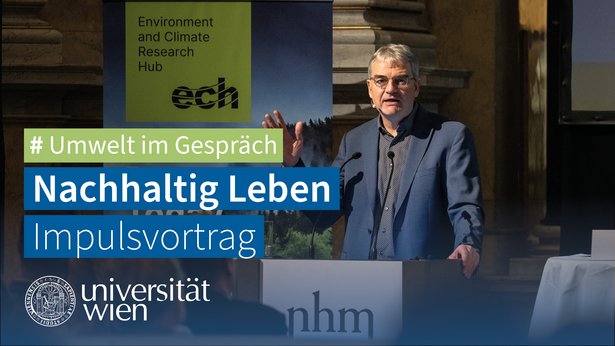
In his lecture, Brand used six paradoxes to explain why ecological restructuring is stalling. "For many people, meat and flying are part of the good life," he said, raising the question of whether sustainable living is even a desirable ideal for politics, business and individuals. Although countries have formulated ambitious climate targets, they continue to rely on fossil fuel growth in their structures. Measures such as electromobility or ‘green growth’ will not achieve their goals, Brand continued, as long as the power relations behind the fossil fuel industry remain untouched. "As long as we remain in the growth engine, we have a problem and cannot get out of it."
Brand therefore advocated moving towards a ‘transformation state’ that breaks away from its fixation on growth, strengthens socio-ecological infrastructures, and creates the foundations for climate-friendly living, "without doing so at the expense of employees." Science and universities must become the driving forces behind social learning processes. "We know a great deal about climate-friendly societies," Brand concluded, “now it's a matter of translating this knowledge into political action and designing a climate-friendly society in such a way that it is attractive and credible to people.”
Between systemic criticism and pragmatism
In the ensuing discussion, moderated by Marlene Nowotny (Ö1), perspectives from science, politics and business came together.
In view of the global setbacks in climate protection, former Climate Minister Leonore Gewessler spoke of a "dramatic finding". She emphasised that individual action remains important, but that structural changes – as addressed by Ulrich Brand – are crucial: "We live in the contradictions of a system in which it is almost impossible to act in a climate-neutral way because the structures are simply not built that way. This is a major task for politicians."
Climate protection has also become a cultural battleground, exploited by various sides. The best antidote to this is participation and involvement: "We need lots of people who won't be swayed by this, who will keep working, forge alliances and counter the narratives of fear," said the leader of the Green Party in the National Council.
When asked about ways out of polarisation and strategies for winning people over to change, Gewessler expressed hope that the current moment of social resistance might be a sign of upheaval: "Shortly before a breakthrough, there has always been a backlash from the other side – we are right in the middle of that now."
Ulrich Brand identified this backlash primarily among fossil fuel companies, which are unwilling to question their business model due to "tough power issues". Daniela Knieling from respACT, a network that advises companies on their path to greater sustainability, reported that "major polluters" are also increasingly turning to them. "They realise that they are not climate-fit, not resilient." Companies need clear framework conditions and planning security in order to invest. This is where education can come in and show that sustainable business practices pay off in the long term.
Nikolaus Hautsch, Vice-Rector of the University of Vienna, contributed the perspective of the concrete implementation of sustainability goals in an institution. The university wants to become climate-neutral by 2030, a Herculean task "with an energy requirement comparable to that of a medium-sized city," but not impossible, according to Hautsch, if changes are introduced at the right pace. "Too much radicalism and speed are not good. Sometimes it makes sense to turn the screw gradually in order to get people on board." Speed is the "key point", he said, adding that trust, transparency and role models are also crucial for creating acceptance. As the largest university in the German-speaking world, the University of Vienna wants to lead by example – and could also serve as a blueprint for society, because "if we can do it, society can do it too," according to the vice-rector's optimistic conclusion.
Communicating change
Questions from the audience made it clear that effective communication is also seen as a key success factor for green change. Ulrich Brand warned against the negative connotations of the term ‘sacrifice’: "Sacrifice sounds like something is being taken away from you, while 'those at the top' carry on as usual. Instead, we should ask what really constitutes a good life – such as healthy nutrition or a fair mobility system." Marlene Nowotny, moderator of the evening and science editor at Ö1, self-critically brought up the role of the media. In times when reputable, well-researched media outlets are competing with social media platforms that are not subject to any rules, communicating climate issues is a particular challenge, according to Nowotny. Experience in recent years has shown that finger-wagging and narratives of sacrifice have had their day – constructive journalism that highlights the opportunities for transformation and behavioural change is the new way forward.
Daniela Knieling, a communications scientist by training, also advocated for positive narratives. Concepts from social psychology, such as ‘nudging’ – gently “nudging” consumers towards sustainable behaviours – could also help motivate people without overwhelming them.
Outlook: Between courage and moderation
In conclusion, Leonore Gewessler quoted Austrian President Alexander Van der Bellen at the Erdgespräche Event in early November: "It only takes 3.5 per cent of people who are committed to a cause to sway public opinion. And 25 per cent to change behaviour in mainstream society." That's good news, according to the Green Party's leader.
Thilo Hofmann reiterated that climate protection should not be left solely to individual lifestyles. "Eating more falafel and cycling instead of eating meat and flying helps the climate, of course, but structural changes are crucial." What he took away from the evening was "the passion for the issue – and the will not to despair, to continue negotiating and fighting."
The evening showed that the existing gap between ideal and reality does not have to be passively accepted, but can be used as a space for innovation and joint further thinking. Sustainability may remain a paradox for the time being, but one thing became clear: change is possible when courage, commitment and a sense of responsibility come together.
During the event, the Sustainability Office of the University of Vienna had an information booth on site in the entrance hall of the Natural History Museum. Our colleagues Flora Rainalter, Christine Ehrenhuber, and Nikola Čanigová took the time to inform interested audience members about their work as part of the University's strategic focus on climate, environment and sustainability.
